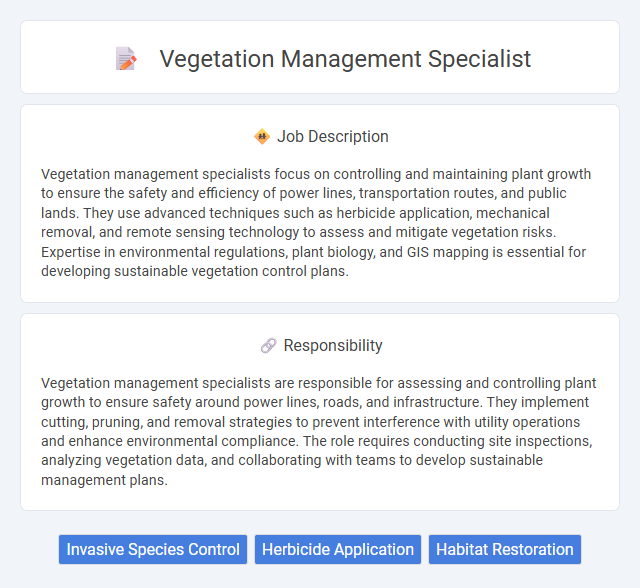
Vegetation management specialists focus on controlling and maintaining plant growth to ensure the safety and efficiency of power lines, transportation routes, and public lands. They use advanced techniques such as herbicide application, mechanical removal, and remote sensing technology to assess and mitigate vegetation risks. Expertise in environmental regulations, plant biology, and GIS mapping is essential for developing sustainable vegetation control plans.
Individuals with strong attention to detail, physical stamina, and a passion for environmental conservation are likely suitable for a vegetation management specialist role. Those who prefer outdoor work and have problem-solving skills may find the job aligns well with their abilities. Conversely, people with limited physical endurance or discomfort working in varying weather conditions might face challenges in this position.
Qualification
Vegetation management specialists typically require a bachelor's degree in environmental science, forestry, agriculture, or a related field, along with certifications such as Certified Arborist or Vegetation Management Technician. Proficiency in plant identification, pest control, and knowledge of local environmental regulations is essential. Hands-on experience with GIS technology, herbicide application, and risk assessment enhances job performance and career advancement.
Responsibility
Vegetation management specialists are responsible for assessing and controlling plant growth to ensure safety around power lines, roads, and infrastructure. They implement cutting, pruning, and removal strategies to prevent interference with utility operations and enhance environmental compliance. The role requires conducting site inspections, analyzing vegetation data, and collaborating with teams to develop sustainable management plans.
Benefit
Vegetation management specialists likely improve the safety and reliability of power lines by effectively controlling plant growth around infrastructure. Their work may reduce the risk of outages and fires, enhancing both public safety and environmental protection. Companies could benefit from cost savings due to fewer emergencies and maintenance needs.
Challenge
Vegetation management specialists likely face the challenge of balancing environmental sustainability with infrastructure safety, requiring precise knowledge of plant biology and ecosystem impacts. They probably encounter difficulties in controlling invasive species and preventing power outages caused by overgrown vegetation near utility lines. The role might demand constant adaptation to changing regulations and climate conditions, increasing the complexity of maintaining safe and compliant vegetation landscapes.
Career Advancement
Vegetation management specialists gain expertise in land clearing, invasive species control, and environmental compliance, which opens opportunities for advancement to supervisory or environmental consulting roles. Proficiency in GIS technology and regulatory knowledge enhances prospects for project management positions within utility companies or government agencies. Continuous certification and training in safety standards and sustainable vegetation practices contribute significantly to career growth and higher earning potential.
Key Terms
Invasive Species Control
Vegetation management specialists specializing in invasive species control implement targeted strategies to identify, monitor, and eradicate non-native plant species threatening native ecosystems. They utilize integrated pest management techniques, including mechanical removal, herbicide application, and habitat restoration, ensuring long-term ecological balance. Expertise in regulatory compliance and environmental impact assessments is essential for effective invasive species mitigation and preservation of biodiversity.
Herbicide Application
A Vegetation Management Specialist specializing in herbicide application is responsible for the strategic use of chemical treatments to control invasive plant species and maintain ecological balance. This role requires expertise in selecting appropriate herbicides, understanding plant biology, and ensuring compliance with environmental regulations to minimize negative impacts. Precision in application techniques and safety protocols is essential to optimizing vegetation control while protecting surrounding ecosystems.
Habitat Restoration
Vegetation management specialists in habitat restoration develop and implement strategies to control invasive species and promote native plant growth, enhancing ecosystem health and biodiversity. They conduct site assessments, monitor vegetation changes, and apply ecological principles to restore natural habitats effectively. Expertise in plant identification, ecological succession, and restoration techniques ensures successful rehabilitation of degraded environments.
 kuljobs.com
kuljobs.com